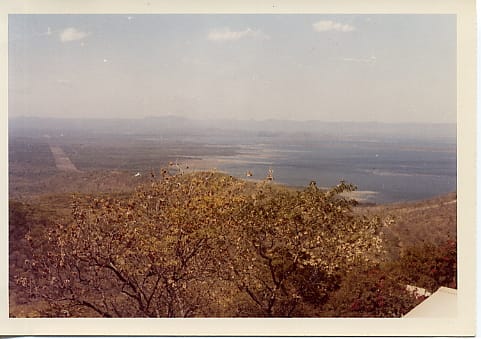The Sting

Brian Hirsch, Mark Gilby, John Seton-Rogers, Phil Harris and Jan Polisensky seeing Lake Kariba Southern Africa’s new inland sea for themselves as the water rose to its maximum capacity in the early 1960s
The Sting
My older brother Brian embarked on a camping trip of his own with his friends Alec Friend, John Seton-Rogers, Mark Gilby, Phil Harris and Jan Polisensky. They wanted to see Kariba for themselves. Mom and Dad had given Brian an old WWII army tent and the heaviest fiberglass canoe ever constructed in the history of man for his thirteenth birthday. He had put it to good use camping locally around Dutchman’s Pool and on the Bembezaan River.
The Sting
Dad had a habit of showing up at these camps unannounced and in the early days shutting them down if they were not up to the standards he had learned in the Ambulance Corps in Abyssinia in the war. Brian’s nickname was Doc. He was a meticulous boy from an early age, a methodical list maker, neat and tidy. He had a first aid kit in a wooden box with a red cross painted on it. There was a tube of iodine, neat roles of bandages of different sizes, gauze and a tube of antiseptic ointment, a finger splint, and a role of Elastoplast. A bottle of aspirins, a prescription bottle of codeine, a course of broad spectrum antibiotics with attached instructions to cope with diarrhea. A tourniquet for snake bites and an arm sling, a pair of scissors, a sterile needle and a razor blade. A packet of bicarbonate of soda and a small collapsible mug to mix a poultice for burns covered the gamut of possibilities.
Now they were older, a couple of the boys managed to borrow their Dads’ cars. They set off for Kariba. It was a long drive. They set up camp on a peninsular of the Lake, pitching the tent, making a French drain and digging a latrine. Then they went off to explore the lake by canoe.
When they returned they found the peninsula was now an island. Water was lapping the camp table and the French drain was full. They hurriedly broke camp and moved to higher country. The canoe was too heavy to drag through the very shallow water to dry land.
After supper Jan, known as Polly, and Mark decided to go fishing. Wading out to the boat with their Coleman lamps Polly got bitten in the water between the toes. What was it? A scorpion? A barbel’s spike? Both were poisonous. “OOOOh! Ahhhh! Oooohhhh!” he yelled.
“Its hurting too much. You go ahead.” He ran out of the water.
The others took no notice. “Agh stop acting man.”
“No man, I can’t. You go ahead take my rod if you like.” He was in so much pain. He became incoherent. Polly’s eyes wandered but were unseeing. He twitched and jerked, salivating all the while. Suddenly they realized he was in real distress. Brian studied the first aid kit momentarily. It didn’t seem to be much use.
It was dark now. The night sounds of the bush were a cacophony in their ears. They carried him to the canoe with trepidation. Everybody tried to tread lightly on the water.
Doc and John paddled Polly across the bay to the main tourist camp. They could see the lights up ahead. It was quicker than driving the car around, besides, they were unfamiliar with the area and didn’t know where the hospital was.
At the dock they commanded the first person they met to drive them to the hospital. “We must get our friend to hospital immediately!” The man was rather shocked at being ordered around by teenagers but Polly was quickly loaded and Brian and John jumped in beside him.
They drove fast through the twisting gravel road up the Matusadona Hills to the hospital.
By morning, Polly had made a full recovery. Anyone who knows him, knows he loves food above all else. After a double mixed grill at the local café he was ready for camp again.
He never knew what bit him. Everyone wore their tackies (tennis shoes) when they went into the water after that. No one can remember if they caught any fish.
